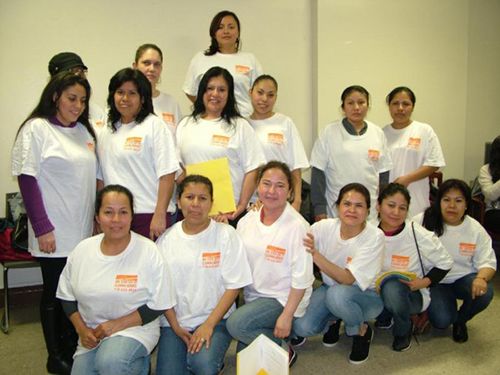 In the United States, worker co-ops are serving as a powerful tool to assist marginalized populations, such as women and immigrants, in gaining stable employment and securing decent wages. The nation’s largest worker co-op, Cooperative Home Care Associates (CHCA), now employs more than 2,000 staff, nearly all Latina and African-American women. Co-operative News reporter Anca Voinea explores the international impact of worker co-ops on gender equality in this article:
In the United States, worker co-ops are serving as a powerful tool to assist marginalized populations, such as women and immigrants, in gaining stable employment and securing decent wages. The nation’s largest worker co-op, Cooperative Home Care Associates (CHCA), now employs more than 2,000 staff, nearly all Latina and African-American women. Co-operative News reporter Anca Voinea explores the international impact of worker co-ops on gender equality in this article:
A new report by the International Co-operative Alliance and the International Labour Organization highlights how cooperatives help promote gender equality. The report, Advancing Gender Equality: The Co-operative Way, was released in time for the International Day of Cooperatives in July, which this year had the theme “choose co-operative, choose equality.”
The research involved an online survey, which gathered perspectives from around the world, and follow-up interviews with key informants. Overall, 581 participants responded to the survey, 64 percent in English, 23 percent in Spanish and 12 percent in French.
Around 75 percent of respondents said they believed cooperatives had improved the participation of women over the past 20 years.
In Europe and North America, interviewees reported achievements in gender equality particularly within the financial sector and in social cooperatives. In Africa, Latin America and India, interviewees reported particular progress in the agricultural sector. In other parts of Asia—where women participate primarily in consumer, credit and producer cooperatives—respondents stated that efforts to enhance women’s participation appear to be underway at all levels of cooperative institutions.
When asked how cooperatives advance the status of women, interviewees mentioned access to employment, improved working conditions and social benefits. They highlighted that cooperatives create employment opportunities by facilitating women’s access to business capital and marketplaces. Cooperatives also provide access to legal and marketing services specifically tailored to women and enable women to gain access to self-employment, they said. Through cooperatives, women also gain collective bargaining power.
The report revealed that cooperatives also facilitate various indirect effects on women’s employment. In fields such as food security, finance, housing, healthcare, childcare and eldercare, cooperatives provide women with affordable and accessible services that enable them to work while meeting their basic needs and those of their families.
Cooperative-led awareness-raising activities that address issues such as child labour, child marriage, HIV, gender-based violence and alcoholism are also seen as having an impact on the status of women and their livelihoods. Many respondents stated that cooperative members also gain training, skills and experience that they would not otherwise have access to.
Eighty percent of survey respondents said that cooperatives are better than other types of private businesses in advancing gender equality. Close to 75 percent stated that among the cooperatives they were most familiar with, women comprised less than 50 percent of the board members, but over 50 percent of membership and more than 50 percent of the customers. These figures suggest that women are among the most involved in and served by cooperatives, but are still among the least likely to hold high-ranking and decision-making positions.
According to survey respondents, 60 percent of the cooperatives with which they are most familiar have equality, inclusion and diversity policies or strategies in place. However, almost 50 percent of respondents said that training sessions relevant to women’s empowerment and gender equality are never held.
Survey respondents and interviewees have also suggested areas for further work to achieve greater gender equality. Respondents pointed to opportunities in areas of women in leadership, implementation of gender equality strategies, cooperation among cooperatives and the role of government. Interviewees recommended, among other things, that cooperatives should consider adopting equality action plans and internal gender equality committees and standards. Other equality measures suggested included the promotion of spaces and events that enhance the visibility of women and men in the cooperative and subscription to national and international agreements on gender equality.


